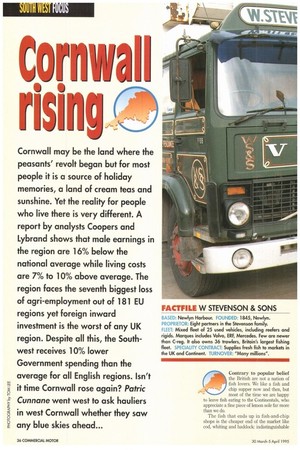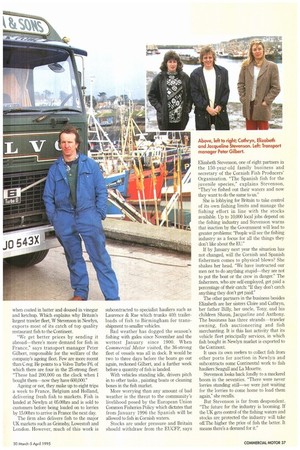Cornwall rising
Page 38

Page 39

If you've noticed an error in this article please click here to report it so we can fix it.
Contrary to popular belief the British are not a nation of fish lovers. We like a fish and chip supper now and then, but most of the time we are happy to leave fish eating to the Continentals, who appreciate a fine piece of lemon sole far more than we do.
The fish that ends up in fish-and-chip shops is the cheaper end of the market like cod, whiting and haddock: indistinguishable when coated in batter and doused in vinegar and ketchup. Which explains why Britain's largest trawler fleet, W Stevenson in Newlyn, exports most of its catch of top quality restaurant fish to the Continent.
"We get better prices by sending it abroad—there's more demand for fish in France," says transport manager Peter Gilbert, responsible for the welfare of the company's ageing fleet. Few are more recent than Greg. He points to a Volvo Turbo F6, of which there are four in the 25-strong fleet: "These had 200,000 on the clock when I bought them—now they have 600,000?'
Ageing or not, they make up to eight trips a week to France, Belgium and Holland, delivering fresh fish to markets. Fish is landed at Newlyn at 05.00hrs and is sold to customers before being loaded on to lorries by 15.00hrs to arrive in France the next day.
The firm also delivers fish to the major UK markets such as Grimsby, Lowestoft and London. However, much of this work is subcontracted to specialist hauliers such as Laurence & Rae which trunks 40ft trailer. loads of fish to Birmingham for trans. shipment to smaller vehicles.
Bad weather has dogged the season's fishing with gales since November and the wettest January since 1900. When Commercial Motor visited, the 36-strong fleet of vessels was all in dock. It would be two to three days before the boats go out again, reckoned Gilbert, and a further week before a quantity of fish is landed.
With vehicles standing idle, drivers pitch in to other tasks, painting boats or cleaning boxes in the fish market.
More worrying than any amount of bad weather is the threat to the community's livelihood posed by the European Union Common Fisheries Policy which dictates that from January 1996 the Spanish will be allowed to fish in Cornish waters.
Stocks are under pressure and Britain should withdraw from the EUCFP, says Elizabeth Stevenson, one of eight partners in the 150-year-old family business and secretary of the Cornish Fish Producers' Organisation. "The Spanish fish for the juvenile species," explains Stevenson, "They've fished out their waters and now they want to do the same to us."
She is lobbying for Britain to take control of its own fishing limits and manage the fishing effort in line with the stocks available. Up to 10,000 local jobs depend on the fishing industry and Stevenson warns that inaction by the Government will lead to greater problems: "People will see the fishing industry as a focus for all the things they don't like about the EU."
If by January next year the situation has not changed, will the Cornish and Spanish fishermen comes to physical blows? She shakes her head. "We have instructed our men not to do anything stupid—they are not to put the boat or the crew in danger." The fishermen, who are self-employed, get paid a percentage of their catch: "If they don't catch anything they don't get paid."
The other partners in the business besides Elizabeth are her sisters Claire and Cathryn, her father Billy, her uncle, Tony, and his children Shaun, Jacqueline and Anthony. The business has three strands—trawler owning, fish auctioneering and fish merchanting. It is this last activity that its vehicle fleet principally services, in which fish bought in Newlyn market is exported to the Continent.
It uses its own reefers to collect fish from other ports for auction in Newlyn and subcontracts some Continental work to fish hauliers Seagull and La Mouette.
Stevenson looks back fondly to a mackerel boom in the seventies. "There were never lorries standing still—we were just waiting for the lorries to come home to load them again," she recalls.
But Stevenson is far from despondent. "The future for the industry is booming. If the UK gets control of the fishing waters and stocks are protected the industry will take off.The higher the price of fish the better. It means there's a demand for it."
































































































